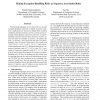Free Online Productivity Tools
i2Speak
i2Symbol
i2OCR
iTex2Img
iWeb2Print
iWeb2Shot
i2Type
iPdf2Split
iPdf2Merge
i2Bopomofo
i2Arabic
i2Style
i2Image
i2PDF
iLatex2Rtf
Sci2ools
107
click to vote
ICSE
2009
IEEE-ACM
2009
IEEE-ACM
Mining exception-handling rules as sequence association rules
Programming languages such as Java and C++ provide exception-handling constructs to handle exception conditions. Applications are expected to handle these exception conditions and take necessary recovery actions such as releasing opened database connections. However, exceptionhandling rules that describe these necessary recovery actions are often not available in practice. To address this issue, we develop a novel approach that mines exceptionhandling rules as sequence association rules of the form “(FC1 c ...FCn c ) ∧ FCa ⇒ (FC1 e ...FCm e )”. This rule describes that function call FCa should be followed by a sequence of function calls (FC1 e ...FCm e ) when FCa is preceded by a sequence of function calls (FC1 c ...FCn c ). Such form of rules is required to characterize common exceptionhandling rules. We show the usefulness of these mined rules by applying them on five real-world applications (including 285 KLOC) to detect violations in our evaluation. Our empirical results ...
Exception Conditions | ICSE 2009 | Necessary Recovery Actions | Sequence Association Rules | Software Engineering |
Related Content
| Added | 20 May 2010 |
| Updated | 20 May 2010 |
| Type | Conference |
| Year | 2009 |
| Where | ICSE |
| Authors | Suresh Thummalapenta, Tao Xie |
Comments (0)

